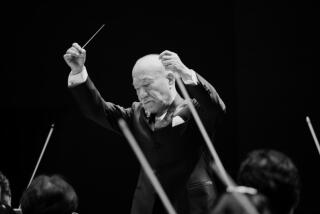Kitaro Brings Heavenly Touch to ‘Earth’ : Music: The New Age composer worked a year and a half on the film, trying to capture the Asian feeling Oliver Stone was looking for.
OK, be honest. Is composer-keyboardist Kitaro the first name that would come to mind as the source of music for Oliver Stone’s latest Vietnam war film, “Heaven and Earth”? The same Kitaro who has been described by the Encyclopedia Britannica as “the quintessential musician of the New Age”? Who has produced nearly 20 recordings of misty-sounding, impressionistic music to float by?
It may be a new concept in war-movie music--the “1812 Overture” it’s not--but Stone in fact did hire Kitaro to score his film, which opened Christmas Day.
The diminutive composer, a fine-boned Japanese of 40, with a glistening mane of black hair reaching to his waist, is quite clear about why Stone chose him to do the evocative score for Le Ly Hayslip’s disturbing tale of coming of age in war-ravaged Vietnam.
“The first thing he said to me was, ‘I don’t want the usual Hollywood movie sound,’ ” Kitaro says. “And I told him, ‘OK! No problem!” Then, grinning for a moment and raising his eyebrows, he adds: “I wouldn’t know how to do that anyhow.”
Perhaps equally important, Stone said he wanted “a kind of Asian feeling for the sound. Not any specific kind of style or any specific instruments, but just a kind of sound that he had in mind.”
*
When Stone began shooting in Southeast Asia last winter, Kitaro retired to his Colorado studio and emerged with the main theme music.
“I sent him the tape, and pretty soon I got a fax that said: ‘Congratulations. This music is great.’ And that’s when I really knew that we could work together.”
Stone’s instincts were right on target. Although the resulting music is clearly within the general lexicon of Kitaro’s style--with plenty of exotic-sounding percussion, gongs and flutes contrasting with blocks of synthesizer and orchestral sounds--it also possesses a dense emotional richness, much of it associated with plangent melodies played on a huqin (Chinese violin), Vietnamese folk tunes and chant-like vocal textures. At times almost Mahleresque with rich, orchestral timbres, the score bristles with energy when earth-shaking taiko drums are brought to the foreground. (The soundtrack, which was recently nominated for a Golden Globe, is available on Geffen Records.)
But if Kitaro and Stone had a similar vision of the soundtrack, their working methods were dramatically different. When the reclusive composer visited the Thailand shooting location, he found Stone characteristically at the heart of a creative whirlwind.
“Oliver Stone is a very hard worker,” he says. “While I was there, he was working, working, working every day. Then, when I came back to the United States, it was the same thing. It’s OK for him, but it’s not the way I work.”
Kitaro has done films before, although never in this country, and never with a director of Stone’s stature. “We both had to make adjustments--sometimes from the music side, sometimes from the film side,” he said. “By the time I was finished, I had spent a year and a half working on it, but it was worth it.”
Kitaro started out as a rock guitarist in high school in Japan, with Otis Redding as a musical idol. After visiting Europe in 1972, however, and hearing the seminal German art rock group Tangerine Dream, he built his first synthesizer and released his debut album, “Astral Voyage.”
Since that time, Kitaro’s music has expanded to include some film and TV scoring, as well as a co-production with Grateful Dead percussionist Mickey Hart.
He now lives near Boulder, Colo., 10,000 feet above sea level in a location that reminds him of his mountain hideaway in Japan, but which allows him to maintain closer connections with other musicians, his record company, and friends around the world.
Often critical of what he characterizes as the parochialism of the Japanese business and musical communities, he embraces a kind of creative pan-culturalism.
“I like to feel that I can make relationships with people in any country,” he explained. “We may talk different languages, but we feel the same things.”
More to Read
The biggest entertainment stories
Get our big stories about Hollywood, film, television, music, arts, culture and more right in your inbox as soon as they publish.
You may occasionally receive promotional content from the Los Angeles Times.








